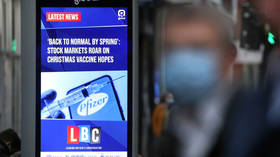BBC guide for talking down to ‘conspiracy theorist’ relatives is a subtle indoctrination on approved propaganda
22 Dec, 2020 19:11

In a highly embarrassing yet entirely predictable U-turn, UK Prime Minister Boris Johnson has effectively cancelled Christmas for an untold number of Britons, less than four weeks after announcing plans to recklessly relax coronavirus restrictions significantly from 23rd - 27th December.
Nonetheless, the BBC feels the risk of people getting within 1.5 metres of loved ones possessed of dangerous, alternative opinions over the festive period remains sufficiently high to justify publishing a five-point guide on “how to talk to people about conspiracy theories without ruining Christmas”.
‘Pass the roast potatoes’
The explainer commences by setting out a number of abstruse and bizarre potential scenarios almost certainly - and mercifully - unfamiliar to most readers.
“You’re dreading the moment. As your uncle passes the roast potatoes, he casually mentions that a coronavirus vaccine will be used to inject microchips into our bodies to track us,” the manual ominously begins. “Or maybe it’s that point when a friend, after a couple of pints, starts talking about how Covid-19 ‘doesn’t exist’. Or when pudding is ruined as a long-lost cousin starts spinning lurid tales about QAnon and elite Satanists eating babies.”
Few would surely argue with the paramount importance of effectively counteracting misinformed anti-science viewpoints that provably result in preventable deaths, or deranged far-right ramblings contending a fraternity of devil-worshipping pedophiles are running a global child sex-trafficking ring and plotting against their nemesis Donald Trump, which have been directly linked to numerous violent crimes.
The BBC’s five stated rules — “keep calm; don’t be dismissive; encourage critical thinking; ask questions; don’t expect immediate results” – also seem thoroughly reasonable principles, valuable in any debate or disagreement.
However, it’s abundantly clear the British state broadcaster’s handbook isn’t an honest attempt to educate concerned citizens in the art of constructively challenging perilously ill-informed friends and loved ones, but just the latest instalment in a long-running establishment campaign to weaponize the terms “conspiracy theory” and “disinformation”.
For example, the section on “encouraging critical thinking” notes that “people who believe conspiracy theories” often say they do their “own research”, which for the BBC is problematic, as “their research tends to consist of watching fringe YouTube videos, following random people on Facebook, and cherry-picking evidence from biased Twitter accounts”.
The obvious implication of this sweeping generalisation is that all alternative and/or obscure sources are inherently dubious, and one should only trust the perspectives of established, mainstream voices - such as those presented by the BBC, for instance.
A questionable proposition indeed, rendered all the more so given the Western media’s own tendency to “cherry-pick” evidence to suit a narrative, and frequently present “random”, “fringe” individuals as “experts”, amplifying and legitimising their voices despite them possessing no professional or educational credentials relevant to the topic under discussion whatsoever.
As a 'reformed' conspiracy theorist quoted in the article ironically states, “you can find experts and very intelligent people who lend credence to any position.”
‘Anyone willing to pay’
There is perhaps no greater example of this proclivity than highly controversial ‘open source’ investigations website Bellingcat. Its founder and chief, college dropout Eliot Higgins, literally can’t remember which higher education course he failed to complete, and acknowledges his fact-finding expertise was gleaned purely from obsessive videogaming.
Yet, he and his organization’s work is considered unimpeachable, and goes entirely unchallenged, by news outlets the world over — despite Bellingcat having been accused even by its supporters and collaborators of publishing information fed to its researchers by Western intelligence agencies. If true, the question of what proportion of this information is false, and accurate, is an open one.
Intriguingly, Higgins and fellow Bellingcat researcher Aric Toler were instrumental in the founding and promotion of “anti-disinformation” initiative First Draft — Claire Wardle, lead researcher at the organization, features prominently in the BBC’s anti-conspiracy enchiridion. Given First Draft’s origins, many of her comments are striking.
“Focus on those who are pushing these ideas, and what they might be getting - for instance, financial gain...or reputational gain in building a following,” Wardle says.
Higgins is of course consistently evasive and opaque on how his outfit is funded, although an assessment of Bellingcat commissioned by one unacknowledged bankroller, the UK Foreign & Commonwealth Office, concluded he and his team were “discredited” due to “spreading disinformation,” and “being willing to produce reports for anyone willing to pay.”
Oddly, for a ‘fact-checker’, Wardle moreover suggests attempting to verify the claims of “someone [who] passionately believes in conspiracies” isn’t in fact the right approach, as “focusing on the tactics and techniques used by people pushing disinformation” is a “more effective way of addressing these conversations”, as opposed to “trying to debunk the information.”
In other words, sidestep the point of discussion, cut to the identity and/or nature of the source, and dismiss their assertions entirely on that basis?
‘Helping quash rumours’
Social media newswire Storyful was also one of First Draft’s founding members and partners. A subsidiary of media tycoon Rupert Murdoch’s News Corp, it incongruously counts among its top staff Alastair Aitken, founder and until May 2017 commander of the British Army’s information warfare unit 77th Brigade.
It’s been repeatedly acknowledged by officials over 2020 the Brigade has been central to Whitehall’s response to the coronavirus pandemic.
At a Downing Street briefing in April, General Nick Carter, the UK’s most senior military officer – and secretly former Honorary Colonel Commandant of the 77th Brigade – outlined the various ways in which the military was supporting the government, noting the Brigade was “helping quash rumours from misinformation, but also counter disinformation.”
Furthermore, in the days after Boris Johnson announced the now-cancelled relaxation of lockdown restrictions for Christmas, the Times reported the Brigade has been deployed to counter “online propaganda” relating to coronavirus, an effort supported by the Cabinet Office’s Rapid Response Unit, the Army, and signals intelligence agency GCHQ.
For all the talk of battling “disinformation” though, there are troubling indications the 77th Brigade’s activities entail, among other things, the use of real, fake and automated social media accounts to disseminate pro-government messages and discredit those critical of Downing Street’s abysmal handling of the pandemic.
While government and military spokespeople deny the Brigade conducts domestic operations, and its clandestine capabilities are “not being and have never been targeted against British citizens,” a statement issued by the UK Army Secretariat to academic Emma Briant in June suggests the exact reverse is true.
“As a UK Government unit, they have two primary audiences – government departments and British citizens, as well as anyone else seeking reliable information online,” the Secretariat stated. “Activity 77th Brigade have been engaged in...is conducted under the same rules as the civil servants they are working alongside.”
This disclosure was highly alarming to Briant, a specialist in state information warfare operations — she suggests “the ill-conceived involvement of this military entity on such sensitive issues” was even likely to “[help] feed distrust of vital messaging on a pandemic among the very groups most paranoid about government actions in response to COVID.” In essence, parachuting the 77th Brigade to the frontline of the pandemic fight may have only increased skepticism and conspiracy theories about the virus.
It may also be significant that General Nick Carter was succeeded in his Brigade post by Alexander Aiken, the most senior “spin doctor” in Whitehall. Aiken also oversaw the creation of the aforementioned Rapid Response Unit.
In July 2018, he authored an article for the government’s website acknowledging “alternative news sources” were one of the unit’s key targets. It’s since been deleted from the web, and it’s not hard to understand why — after all, it was a rare, overt public acknowledgement of the relentless establishment drive to discredit, marginalize and suppress all dissenting viewpoints and inconvenient facts, no matter their legitimacy, which the BBC’s article so amply exemplifies.
The statements, views and opinions expressed in this column are solely those of the author and do not necessarily represent those of RT.


0 Comments:
Post a Comment
Subscribe to Post Comments [Atom]
<< Home